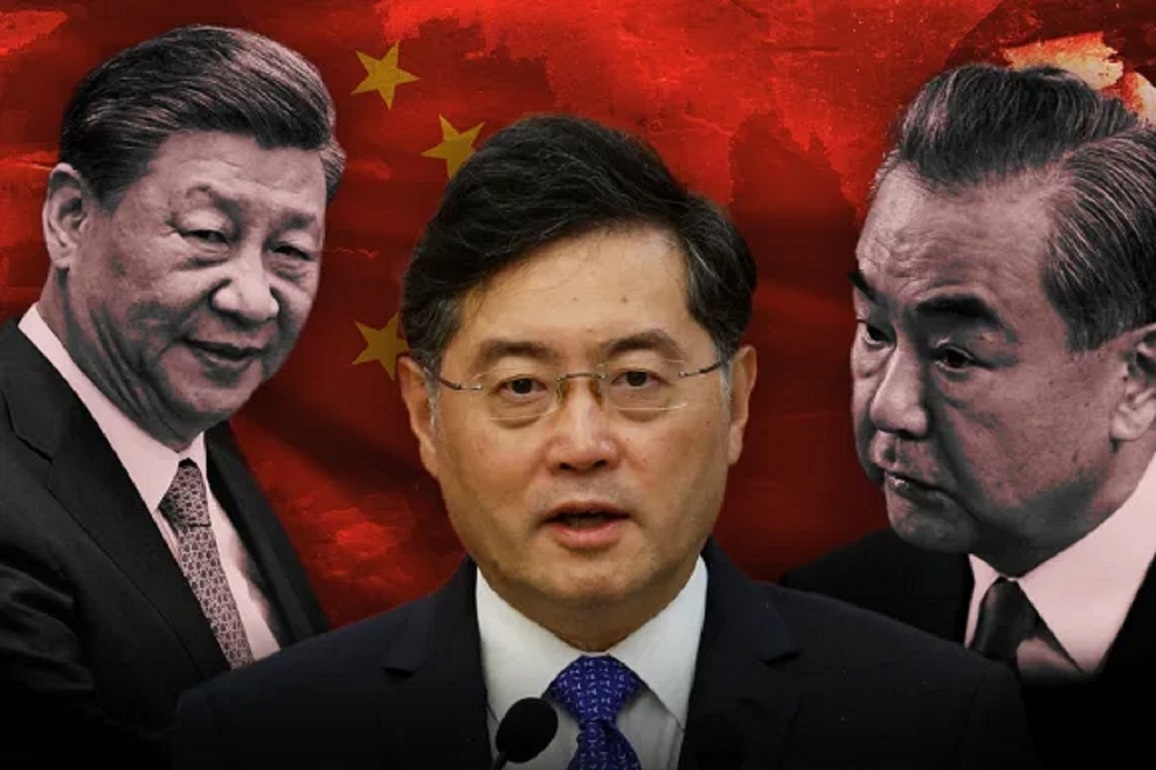Qin Gang was appointed as China’s Foreign Minister in Dec 2022, in the place of Wang Yi who was Foreign Minister from 2018 to 2022 view Qin’s influential position in the Chinese Communist Party. However, a news report, appearing barely a few months after his appointment states: “Chinese foreign minister’s (Qin Wang) disappearance from media sparks curiosity (The News, 2023), has been quite intriguing. He had been absent from public appearances, sometime before being sacked from the Foreign Minister’s post”. The fact that Qin Gang was a career diplomat and considered close to Mr Xi Jinping, has made the sacking more mysterious. His unceremonious removal is expected to have a bearing on China’s foreign policy. This development has undoubtedly caught the attention of the world, because of its likely implications. Qin has been replaced by his predecessor Wang Yi, which has made the matter more mysterious.
This article thus tries to decipher the circumstances for Qin’s removal, subsequent developments, and impact on the global scenario.
Removal of Qin Gang as Foreign Minister and Implications
Dramatic Rise
Qin Gang who had spent his entire career in China’s diplomatic service, hails from the northeastern city of Tianjin. He was one of the staunch Chinese diplomats defending China’s Foreign Policy. He was known for his sharp comments made in defence of the increasingly assertive foreign policies of China and his blunt speech against the West.
His caustic discourses against the West earned him a reputation as a tough “wolf warrior,” a nickname given to Chinese diplomats who respond vehemently to Western nations they perceive as hostile. He vehemently complained that China’s global image had taken a beating for worse because of Western media berating, as it had never accepted the Chinese political system or its economic rise.
Qin Gang had been one of the rare diplomats in China, who rose higher within the Communist Party hierarchy, over the past decade. Many have attributed his dramatic rise in China’s polity to his closeness to President Xi Jinping.
Analysis of his career for the past decade has revealed that Qin worked as head of the foreign ministry’s diplomatic protocol department during 2014-2017. During this period, he regularly interacted with Xi and was responsible for organizing and supporting Xi’s foreign visits. This strengthened his bonds with the President.
With his quite apparent closeness with the President, Qin was viewed as Xi’s protégé and was appointed as a vice-minister of foreign affairs, a position he held between 2018 and 2021.
This was followed by an important assignment to Washington as China’s ambassador to the United States. During this tenure, he gained prominence through public and media appearances in which he very deftly justified Chinese geopolitical positions. However, as an ambassador, he was quite diplomatic and less confrontational than he had been while in Beijing. In his tenure as China’s Ambassador to the USA, he was responsible for putting the relationship between the world’s two largest economies back on track.
His steadfast performance and the trust he gained from Xi, resulted in his appointment as China’s Foreign Minister in Dec 2022, at a relatively young age of 57, becoming one of the youngest foreign ministers in Chinese history. Qin also gained entry into the Communist Party’s central committee in 2022, a reflection of the party’s trust in him. Qin replaced Wang Yi- another longtime trusted aide of Xi Jinping.
Catastrophic Fall
Many analysts anticipated a further rise for Qin. However, predictions of many political pandits went wrong when Qin, the powerful foreign minister of China, suddenly disappeared from public interactions in June 2023, barely six months after his elevation to that post. The mystery of his whereabouts and fate certainly sparked intense speculation, both inside and outside the country. Qin was finally sacked from his latest position on 25 Jul 2023. He was intriguingly replaced by his predecessor Wang Yi.
While speaking on the subject, Wu Qiang, an independent academic and political commentator in China, stated that the episode spoke volumes about the current state of Xi’s rule. He opined that the abrupt disappearance of Qin was highly troublesome as it indicated the possibility of Beijing moving closer to a “mystical and unpredictable” form of autocratic leadership – a situation that does not bode well for global politics.
On the whole, This episode has not only been embarrassing for Xi but could lead to understandable reticence among global policymakers and diplomats in their engagement with Chinese officials.
(Muzumdaru,2023, Levine et al, 2023)
It would be appropriate to examine the probable impact of Qin’s exit on the Foreign Policy of China, at this juncture.
Impact of Qin Gang’s Sacking on China’s Foreign Policy
The mysterious disappearance and subsequent sacking of Qin Gang, the perceived protegee of China’s President from the post of foreign minister demonstrated the opaqueness of China’s political system as well as the dominance of Xi Jinping.
China has spent many years trying to position itself as a responsible and stabilizing fixture on the world stage. In its public outreach, China has always projected itself as a trusted partner that can be relied upon for its predictability and long-term horizons. China also pointed out that this was in contrast to many countries, policies which could be easily swayed by domestic politics. A hint of the USA was unmistakable here.
On the above background, Qin’s sudden disappearance, his sacking, as well as removal of all references to his activities from China’s Foreign Ministry website, pointed to a political purge and is being viewed by the world that way. China thus has its task cut out, to manage the fallouts of Qin Gang’s sudden removal, though Qin’s extramarital affair while he was stationed in Washington as China’s ambassador to the United States and his poor handling of tense relations with Washington, particularly Qin’s failure to mount an effective response to President Biden calling Xi a “dictator” after Blinken’s visit to Beijing, have been propagated as the possible reasons.
But this event has once again shown to the world that China’s political system is still hazy and runs by the whims of the leaders, not well understood by the world. Many countries working on constructively engaging with China have been jolted to find that policymaking in China can be as erratic and driven by domestic politics, as China blames other countries for. This is certainly going to pose problems for many nations including the USA and India.
Another implication that many countries may face would relate to China’s foreign policy implementation. Qin was known to be a staunch wolf gang warrior, but his successor Wang is not. Wang’s appointment as the foreign minister points to China’s shift away from “wolf warrior” diplomacy.
Chinese foreign policy now seems to be moving in favour of more traditional foreign policy approaches. This opinion is based on the fact that over the years Wang has signalled a more adaptive approach to foreign policy, depending on the audiences and policy objectives. Wang’s responses though had ranged from aggressive language to constructive approaches and some awkward misses but were away from the Qin’s style of diplomacy.
No dramatic shift in China’s foreign policy is expected because of this change. However stylistic and personality changes could make a difference to the foreign policy dealings with many countries. This could be particularly true in U.S.-China and US-India relations, where substantive engagements happen through high-level meetings. Such meetings mostly rely upon the personalities and approaches of the top leaders.
China Leadership Mindset
The above development has once again shown that China’s entire political system is opaque and revolves around one man: Xi Jinping. He has consolidated his personal hold on power tighter than any top leader since Mao Zedong (1949-1976). It is evident that Xi now exercises centralized control over all major bureaucratic systems, including the Communist Party, the People’s Liberation Army, and state ministries, including the Ministry of Foreign Affairs.
Xi has also steered all key policy initiatives. He has given a new spin to China’s political system and has made the selection, promotion, and dismissal of leaders in the above-cited bureaucracies less transparent.
China’s strongman has made it clear that he would select, promote, and remove officials primarily on the basis of their loyalty, as compared to competence. Loyalty becomes the key criterion for personnel selection because leaders like Xi are never sure about whom they can trust. This, however, brings uncertainty to the minds of the countries dealing with China.
Indicators – The Wang Effect
Analysts feel that Wang’s reappointment suggests that Xi seems to be keen on continuing the relatively positive trends in engagement with the USA. He wants to build a more stable relationship with Washington, ahead of a potential meeting with President Biden, at the Asian-Pacific Economic Cooperation leaders’ meeting- in San Francisco in November 2023. Though Wang had also often criticized U.S. officials and U.S. policy, he is a known face in Washington, who had demonstrated an accommodative attitude. Wang is now the head of both the Chinese Foreign Ministry and the Communist Party’s Foreign Affairs Commission. He is also a member of the CCP’s ruling Politburo and one of Xi’s most trusted aides. So, U.S. diplomats would feel more comfortable dealing with him as Wang’s public and private pronouncements align with the upper echelons of the Chinese government and Communist Party, though personnel shuffling may not address the structural challenges in international relations.
(Levine et al, 2023a)
The above strategy of Xi seems to be working. National security adviser Jake Sullivan held an unscheduled meeting with China’s top diplomat, Wang Yi, in Malta during the weekend of 16-17 Sep 2023 as per the USA White House report.
The report also stated that the “ said meeting was part of the Biden administration’s efforts to reopen the high-level communication lines with China’s communist regime and manage bilateral ties that have deteriorated over a slew of issues, from trade to Taiwan.”
Interestingly in the past three months, since the sacking of Qin, four Cabinet-level USA officials have visited Beijing: Secretary of State Antony Blinken, Treasury Secretary Janet Yellen, climate envoy John Kerry, and Commerce Secretary Gina Raimondo (Li, 2023). The outcomes of this increasing closeness of the USA with China have the potential to impact global politics, especially in the Indo-Pacific region. This would also have an impact on the already strained Indo-China relationship.
Specific Implications for India
State Councilor and Foreign Minister Qin Gang met India’s External Affairs Minister Subrahmanyam Jaishankar on the sidelines of the Shanghai Cooperation Organization (SCO) Foreign Ministers’ Meeting in Goa on 04 May 2023.
During the meeting, he had said, that as the two most populous developing countries in the world, they should draw experience and lessons from history, look at bilateral relations from a strategic and long-term perspective, and respect and learn from each other.
He also opined that both countries could contribute to each other’s success, pursue a new path of living in harmony, peaceful development, and common revitalization between neighbouring major countries. to boost world peace and development (MFA-PRC,2023)
Subrahmanyam Jaishankar (Min of EA India) in response, elaborated on India’s views on India-China relations. EAM conveyed that restoration of normalcy would require restoration of peace and tranquillity. He also stated that India and China need to strengthen cooperation in many areas, and India hopes to continue to work with China to maintain peace and stability in the border areas through consultation (MEA Annual Report, ND)
Though there was not much new in the exchange of views, a ray of hope was still there that dialogue may facilitate the resolution of many pending issues. However, the issues have gotten complicated with the removal of Qin.
It is important to note that Wang Yi, both predecessor and successor to Qin, met India’s External Affairs Minister Dr Jaishankar on 25 Mar 2022. In that meeting, Wang had said (MFA-PRC,2022) :
“As mature and rational major developing countries, China and India should put the boundary issue in a proper place in bilateral relations and should not let the boundary issue define or even affect the overall development of bilateral relations. China and India should help each other succeed, rather than engage in attrition; support each other, rather than exclude each other. The two sides need to uphold the important consensus reached by the leaders of the two countries that “China and India pose no threat but offer development opportunities to each other”, properly resolve the boundary question, and manage and control differences, so as to contribute to the development of bilateral relations.”
The above clearly demonstrates Wang’s stand on the most important issue of border incursions by China, especially in Galwan Valley and Gogra Host Springs, which occurred during Wang’s tenure as the Foreign Minister. It is obvious that the road ahead for India is not going to be easy. It would be better for India to watch further developments with abundant caution.
Conclusion
China’s dealings with the world have been mostly opaque and aggressive. Since Xi’s ascendency to the top, the sharpness has increased further.
Qin, a career diplomat – considered to be close to the President and saw a dramatic increase in his stature, finally being appointed as the Foreign Minister in Dec 2022. He was known not only to be a staunch supporter of China’s foreign policy but also a tough ‘wolf warrior.’ But his fortunes took a turn for the worse in June 2023. He was seen missing from public appearances and many speculations were made about his future. He was ultimately sacked from his post as the foreign minister, in July 2023. His sacking took many countries by surprise and also demonstrated to the world Xi’s hold on the party and bureaucracy. Qin was succeeded by his predecessor Wang Yi. Wang is an experienced diplomat known for his adaptive approach. It seems that China has decided to move from ‘wolf gang diplomacy’ to a more traditional approach to foreign policy, with Wang assuming the responsibility.
Analysts feel that this change will certainly have an impact on the dealings of many countries with China, as the world is weary of Xi’s stronghold on the policy matters of China. They also feel that this change may have been done by Xi, to improve political relations with the USA, prior to the probable meeting with President Biden in San Francisco in November 2023. This strategy seems to have started paying dividends already.
As far as India is concerned, Wang’s appointment may not be comfortable, as Galwan’s incursions occurred during his previous tenure as the foreign minister. It is a matter of record that during his meeting with Dr Jaishankar (Minister of EA) in March 2022, he had advised (?) India that it should not let the boundary issue define or even affect the overall development of bilateral relations. In addition, increasing closeness between the USA and China would pose its own problems for India. It would be better for India as important indicators while charting its response.
Some analysts also feel that this sacking of Qin may prove troublesome for Xi. But Xi has faced many a crisis earlier too and had emerged stronger from them. How he may overcome this crisis and how global politics will alter due to this event only time will tell.
Title Image Courtesy: The Sydney Morning Herald
Disclaimer: The views and opinions expressed by the author do not necessarily reflect the views of the Government of India and Defence Research and Studies
References:
The Hindu, 16 September 2023, The Hindu, Online edition, Retrieved from: https://www.thehindu.com/news/international/chinese-defence-minister-gen-lis-absence-at-top-military-meeting-heightens-speculation-about-his-removal/article67315159.ece, accessed on 17 Sep 2023
Mazumdaru Srinivas, 25 Jul 2023, Who is Qin Gang, China’s sacked foreign minister?, DW, online, Retrieved from: https://www.dw.com/en/who-is-qin-gang-chinas-sacked-foreign-minister/a-66345677, Accessed on 14 Sep 2023
Levine Rosie; Scobel Andrew, Gallagher Adam. 27 July 2023, What Does Qin Gang’s Removal Mean for China’s Foreign Policy?, United States Institute of Peace, Online, Retrieved from: https://www.usip.org/publications/2023/07/what-does-qin-gangs-removal-mean-chinas-foreign-policy, Accessed on 10 Sep 2023
Li Dorothy, 17 Sep 2023, Biden National Security Adviser Secretly Meets With China’s Top Diplomat in Malta, The Epoch Times, Online, Retrieved from: https://www.theepochtimes.com/china/biden-national-security-adviser-secretly-meets-with-chinas-top-diplomat-in-malta-5492980?utm_source=morningbriefnoe&src_src=morningbriefnoe&utm_campaign=mb-2023-09-18&src_cmp=mb-2023-09-18&utm_medium=email&est=tVWxYtO2OwStAD9cbe3y12cg6dDvyf3AeOIWeYnoz1HjF%2BVfLjndLKP4d1aRMx98nfNLHg5n, Accessed on 18 Sep 2023.
Min of Foreign Affairs-PRC, 05 May 2023, Qin Gang meets with Indian External Affairs Minister Subrahmanyam Jaishankar, MFA PRC, Online, Retrieved From: https://www.fmprc.gov.cn/eng/zxxx_662805/202305/t20230505_11070924.html, Accessed on 10 Jul 2023
MEA Annual Report-2022, ND, Min of External Affairs (GOI), Online, Retrieved from: https://mea.gov.in/Uploads/PublicationDocs/36286_MEA_Annual_Report_2022_English_web.pdf, Accessed on 14 Sep 2023
Min of Foreign Affairs PRC, 25 Mar 2022, Wang Yi Holds Talks with Indian External Affairs Minister Subrahmanyam Jaishankar, MFA-PRC, Online, Retrieved from: https://www.fmprc.gov.cn/eng/zxxx_662805/202203/t20220326_10656097.html, Accessed on 16 Sep 2023





